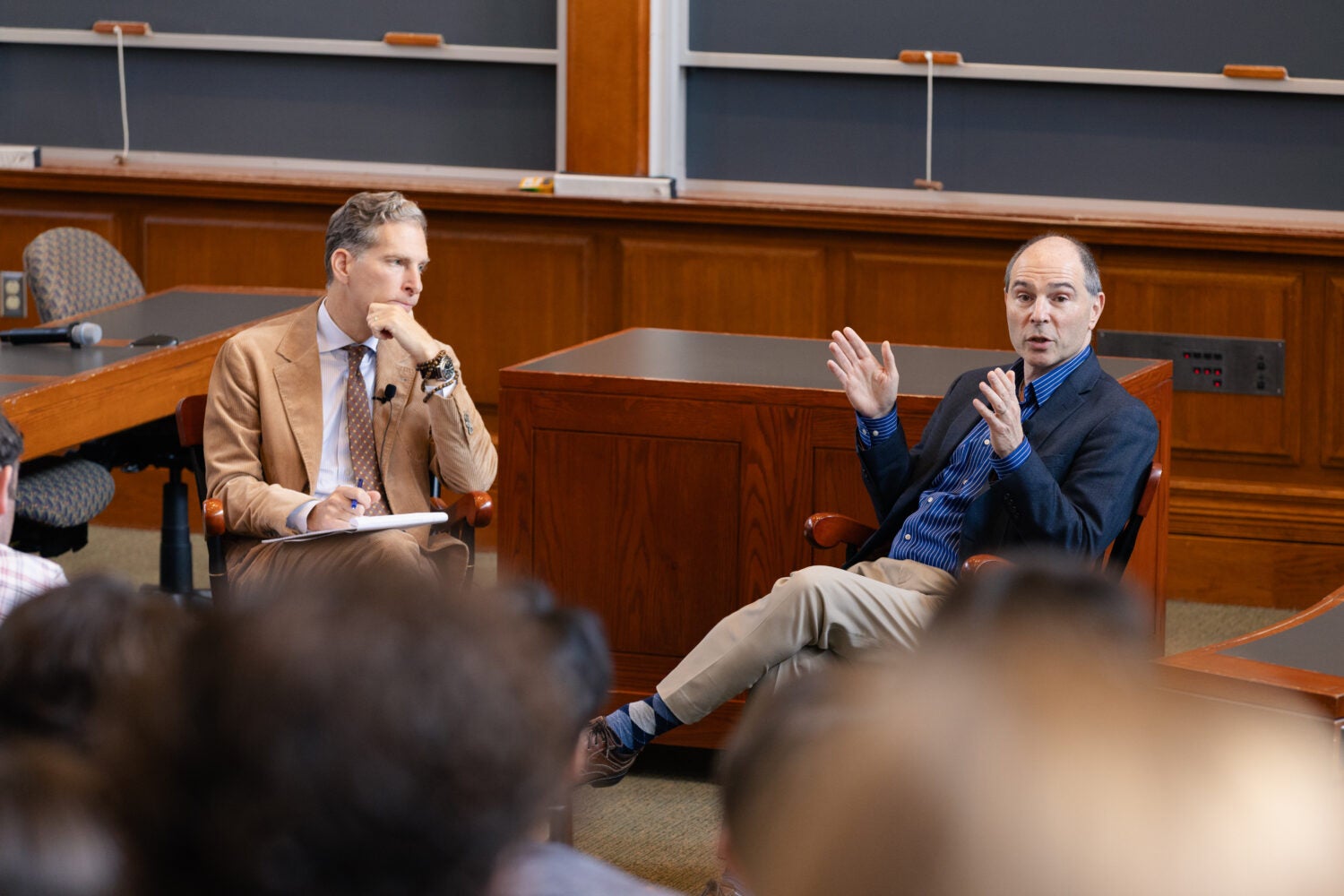In the U.S. Constitution, Article I, Section 8 lists 27 powers explicitly given to Congress. Throughout American history, a robust consensus has existed that these “enumerated” powers are intended to limit federal legislative authority.
According to constitutional expert Richard Primus, the Theodore J. St. Antoine Collegiate Professor of Law at the University of Michigan Law School, that assumption is fundamentally flawed.
During a recent conversation with Felix Frankfurter Professor of Law Noah Feldman, Primus explained his theory that the enumerated powers were intended as a baseline for Congress’ authority — not a limit. In her introduction of Feldman and Primus, Professor Jeannie Suk Gersen praised Primus’s groundbreaking perspective and noted that the two constitutional law theorists have been longstanding interlocutors.
“Once in a really long while, you read something that makes you wonder if you’ve been doing it all wrong. And that is the effect that Richard Primus’s book ‘The Oldest Constitutional Question’ had on me,” she said. “I’m really delighted to be hosting this conversation between Richard Primus and Noah Feldman … who have been engaging in earnest with each other about constitutional theory since they were teenagers.”
Feldman and Primus then began to unpack the thesis of Primus’s latest book, which attempts to debunk what scholars call “enumerationism,” the view that congressional authority is limited to the enumerated powers outlined in the nation’s founding document.
“We’ve been expecting the enumerated powers to do a thing that they were not built to do, and then we get disappointed and upset when they don’t do them.”
Richard Primus
“The text of the Constitution does not say what enumerationism teaches us to say,” said Primus. “The historical story that says the framers enumerated the powers of Congress in order to limit the reach of Congress, I think, is mostly wrong.”
“It’s my view that the enumeration of powers is a wheel that turns no part of the mechanism of federalist limitation. That’s not what it does,” he said. “That’s not what it was written to do. And when we press it into service to try to limit Congress, it functions very badly because it’s not well designed for that.”
Primus argued that, for the Constitution’s framers designing a federal government, assigning Congress an explicit but non-exclusive list of powers made sense. In its infancy, Congress would have to contend with the executive and judicial branches in addition to the well-established state governments already in place.
“If you’re trying to get something powerful going, against opposition, in a world where there are other power players, it’s sometimes helpful to specify with particularity what its warrant is.”
According to Primus, historical accounts from the drafting and ratification of the Constitution support his hypothesis that the list was not intended to be comprehensive. Although some framers at the constitutional convention, such as Luther Martin and George Mason, initially called for limiting congressional power via enumeration, those efforts, Primus said, were rejected.
“We can find voices like that. But, as far as I can tell, they mostly get pushed aside. These are ideas that are articulated in the [constitutional] convention, but people stand up after that and say, ‘Yeah, that’s just not going to work. It’s not practical to enumerate all the powers that this Congress is going to need,’” said Primus. “And they give various reasons why they think it’s not. So, those calls for enumerated powers don’t get picked up and turned into enumeration.”

He also contended that, prior to ratification, the perception of enumeration as a limit on Congress mostly arose when federalist framers were attempting to sell the idea of a new Constitution to anti-federalists who opposed establishing a strong national government.
“The opposition is going to come mostly from people who think this government is too strong. So, as a rhetorical matter, the supporters of the Constitution need to try to say it’s actually not going to be as strong as you think it is,” said Primus.
While some supporters of the proposed Constitution interpreted it as giving Congress general legislative power, he contended, many of them argued otherwise to appease those hesitant to vote in favor of ratification.
“It’s not helpful to make that argument at that point, so [federalists] argue, ‘No, the powers are enumerated,’” he said. “And they especially argue it in response to the leading anti-federalist objection, which is: ‘Why does this thing have no bill of rights?’”
But if enumerationism did not come from the framers, as Feldman asked, “Where’s the smoking gun? Who’s the bad guy who invented enumerationism and pulled the wool over all of our eyes?”
“I have a sinking suspicion that I know who the answer to that is,” added Feldman, who authored “The Three Lives of James Madison: Genius, Partisan, President” in 2017. “But I’ll let you tell it. How did it become the consensus view?”
According to Primus, enumerationism emerged in earnest during the debate over whether to establish a national bank. Madison, who opposed its formation, pointed to the absence of an enumerated power authorizing Congress to create such an institution. Madison, despite being hailed by history as the “Father of the Constitution,” lost that debate about the document’s meaning. Congress passed, and President George Washington signed, legislation creating the First Bank of the United States in 1791.
The argument that congressional authority is limited to the enumerated powers, Primus explained, did not triumph until the presidency of Thomas Jefferson, which began in 1801.
“The Jeffersonians, who like making arguments, pick [enumerationism] up and it becomes orthodoxy over the course of the first several decades of the 19th century,” said Primus, “But it never is the way government actually works. It becomes an orthodoxy in speech and not in practice.”
He also noted that treating the enumerated list as a floor on its powers and not a ceiling is more consistent with how Congress has operated since the New Deal in the 1930s. As such, his theory retroactively exonerates the expansion of congressional authority beyond the powers listed in Article I, Section 8 — a century-long trend that some constitutional originalists have lamented.
“The going intuition among many constitutional lawyers has been: We must be doing something wrong,” said Primus. “It can’t be the case that the enumerated powers are that expansive, or else why would they be enumerated? And what I want to say is, ‘No, we haven’t all been doing it wrong for 100 years.’ It’s not the case that judges, appointed by presidents of both political parties for going on 100 years, have been doing it all wrong. We’ve been doing it fine.”
“What we’ve been doing wrong is talking about it the wrong way,” he said. “We’ve been expecting the enumerated powers to do a thing that they were not built to do, and then we get disappointed and upset when they don’t do them.”
Want to stay up to date with Harvard Law Today? Sign up for our weekly newsletter.
